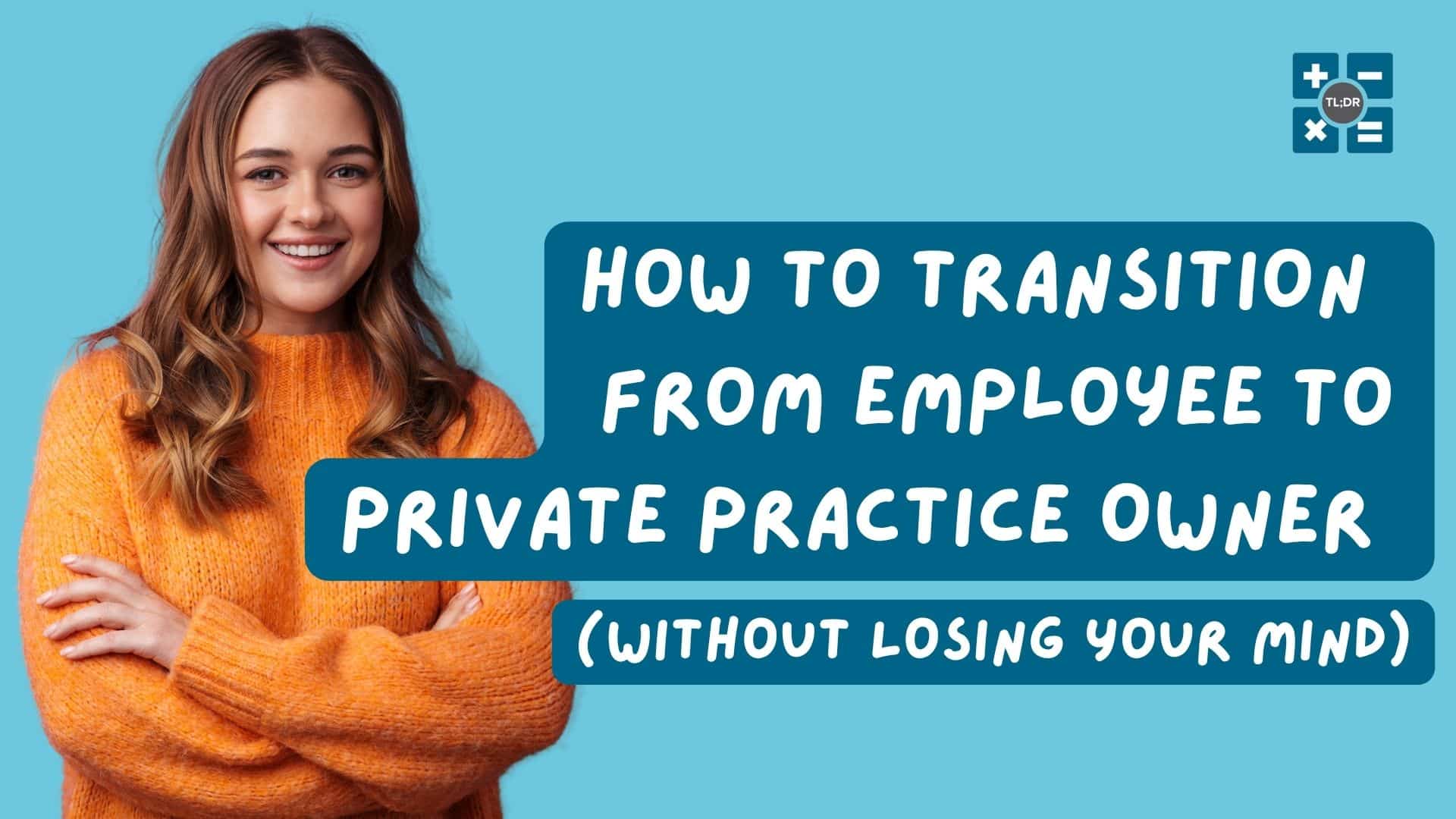So you’re thinking about going out on your own.
First off, congrats! That’s a huge step.
Whether you’re dreaming of more autonomy, a flexible schedule, or just being your own boss (finally), being a private practice owner can be one of the most rewarding moves in your career.
That said, it also comes with a whole bunch of new stuff to figure out: paperwork, licenses, taxes, business decisions you’ve probably never had to think about before.
It’s not always fun, but of course it is doable. And often, very rewarding!
From the desk of an accountant (who only deals with therapists), here’s what you need to know to go from employee to practice owner without getting buried in the admin.
1. Register Your Business (Yep, You Need to Be a “Business” Now)
The first step is making it official. You’ll need to register your business with your state. Most therapists set up an LLC (Limited Liability Company) to start. It gives you some legal protection and helps separate your business from your personal life.
If you’re in a state that allows PLLCs (Professional LLCs), you might need to go that route instead, especially if your state regulates therapy licenses that way. Some states are very specific about this, so it’s worth checking or talking to someone (👋 hi, that’s us).
2. Check Your Licensing (Yes, Again)
Even if you’re already licensed as a therapist, some states require you to register separately as a practice owner or apply for a firm-level license, especially if you’re using a name other than your own.
For example:
- In California, solo practitioners don’t need a firm license.
- In New York, you might need to register your PLLC with the state education department.
It’s annoying, we know, but you don’t want to miss this step and get flagged later.
3. Segregate Your Clients and Services
If you’re starting your own practice while still working somewhere else (totally normal during the transition), be very careful about how you handle client relationships.
Avoid anything that could be seen as:
- Poaching clients
- Using company tools or materials for your new practice
- Marketing to clients of your employer
When in doubt, check your employment agreement and talk to a lawyer if needed. Keeping things clean and professional will save you headaches later.
4. LLC vs. S Corp: What’s the Deal?
We get this question all the time.
Here’s the quick version:
- LLC: Easy to set up. Works well when you’re just getting started. All your income passes through to your personal taxes.
- S Corp: A tax status you can elect once you’re making a consistent profit (usually after the first year). It lets you split income into salary + distributions, which can lower self-employment taxes, but it adds complexity (like payroll).
Most therapists don’t need an S Corp in their first year.
We usually recommend starting with an LLC and waiting until you have steady income before even thinking about the S Corp election.
Need help deciding? That’s literally what we’re here for.
5. Start With Systems That Can Grow With You
Once the legal stuff is in motion, you’ll also want to:
- Set up a business bank account (don’t mix personal + business funds)
- Choose an EHR (like SimplePractice or TherapyNotes)
- Get liability insurance
- Start tracking your expenses (yes, even that $14 Zoom upgrade)
Even if you only have a few clients, building good systems now will make everything easier later, especially come tax time.
6. Don’t Forget About Quarterly Taxes
This is the one that sneaks up on people.
When you’re an employee, taxes get taken out of your paycheck automatically. But when you’re self-employed, that doesn’t happen. You’re responsible for setting money aside and sending in estimated taxes four times a year.
If you don’t? You could owe a big lump sum in April plus penalties.
Our rule of thumb: set aside 25–30% of every dollar you make for taxes, just to be safe.
And make sure you’re sending those estimated payments on time (we can help track them for you).
7. Get Your Bookkeeping in Order Early
Even if you’re only seeing a handful of clients right now, don’t wait to start tracking your income and expenses.
You’ll want a business bank account, a simple system (QuickBooks, Xero, or even a spreadsheet to start), and a regular routine for keeping things updated.
Good bookkeeping helps you:
- Stay on top of taxes
- Know how much you’re actually making
- Catch deductions you’d otherwise forget
It doesn’t have to be complicated, but it does need to get done. If you’re not a numbers person, this is one of the first things we recommend outsourcing.
TL;DR? Start simple, start clean, and don’t DIY the hard stuff.
Starting a private practice doesn’t have to be overwhelming.
Register your business, get your licenses in order, keep your money clean, and don’t rush into an S Corp.
The rest? You can build as you grow.
And if you want someone to walk you through it (and handle the books + taxes so you don’t have to Google “what can therapists deduct?” every five minutes), that’s exactly what we do.
👋 Ready to go out on your own? Let’s talk.
Until next time!





